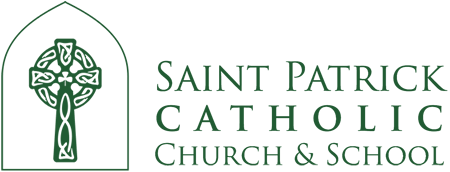
Planned Giving
Did you know that if you die without a will, then the state of Washington will dictate how your estate will be distributed? In other words, your will is written for you, in a one-size-fits-all approach. The order of distribution starts with spouse, children, parents, and siblings, and continues up and down the family tree until finally landing on the state of Washington.

Remember the School & Church in your Will & Estate Planning
For a lot of people, the order of distribution makes sense. But for many others, it does not. Additionally, the order of distribution does not provide gifts to charities, such as Saint Patrick Catholic Church & School. One sure-fire way to prevent this from happening: Write a will and create an estate plan!
What is Planned Giving?
Planned Giving is a method of supporting Saint Patrick Catholic Church & School that enables a donor to make larger gifts than they could make from their income. A planned gift is any major gift, made in lifetime or at death as part of a donor’s overall financial and/or estate planning.
While some planned gifts provide a life-long income to the donor, others use estate and tax planning techniques to provide for Saint Patrick Catholic Church & School and other heirs in ways that maximize the gift and/or minimize its impact on the donor’s estate.
Whether a donor uses cash, appreciated securities or stock, real estate, artwork, partnership interests, personal property, life insurance, a retirement plan, etc., the benefits of funding a planned gift can make this type of charitable giving very valuable to both the donor and Saint Patrick Catholic Church & School.

How to Leave a Legacy
For the future, and for the genuine difference that Saint Patrick Catholic Church & School can make in our community, you can provide a legacy through your estate plan in a variety of ways, some as simple as including a statement in your will.
If you already have a will, you can easily add a codicil (an amendment to your will) providing for a bequest. If you do not have a will, this is the time to prepare one. A will is fully revocable while you live—you retain control and can easily make revisions should your circumstances change.
When you include Saint Patrick Catholic Church & School in your will, you are supporting our Catholic faith community far into the future. Your bequest can take several different forms.
Your Legacy
Ways To Give
Bequests — designating Saint Patrick Catholic Church & School as the beneficiary of assets by will, trust, or beneficiary designation form is one of the many ways to give.
Giving can be done either directly or through a gift model that can provide tax benefits and even income.
- IRA Rollover
- Beneficiary Designation Gifts
- Charitable Gift Annuity
- Charitable Remainder Unitrust
- Charitable Remainder Annuity Trust
- Charitable Lead Trust
- Sale and Unitrust
- Bargain Sale
- Give It Twice Trust
- Life Estate Reserved
Planned Giving Support
To assist individuals in making planned gifts to Saint Patrick Catholic Church & School through wills, gifts annuities, charitable remainder trusts, and other appropriate instruments and to provide wills and basic estate planning seminars at Saint Patrick Catholic Church & School.
Planned Giving Mission
Planned Giving Seminars
Planned Giving Seminars on Wills & Estate Planning are offered periodically. During our Wills and Estate Planning Seminars, we talk about how you can care for your family by creating an estate plan. A current estate plan is vital to making sure your wishes are carried out and can help you leave a lasting personal legacy.
The free seminar is for everyone! Adults of all ages, with estates of all sizes, will benefit from the information presented by the Planned Giving Office and a local attorney to learn more about the following:
- How to distribute your estate
- How to prepare a will
- Guardianship issues
- Estate gifting techniques and tax-saving options
- Methods of increasing your retirement income
- How to leave a legacy to your parish community
- Assurance that “putting your affairs in order” is easier than you think
The parish community can benefit from such plans. We encourage you to take action. Start by asking Who, What, How questions: Who is dependent on you for financial support? Who will receive your assets? What significant life changes have occurred in your family since you last updated your estate plan? What else do you desire for your heirs beyond money? How much is “enough” to leave for your heirs? How can you be a role model for your heirs and loved ones?

